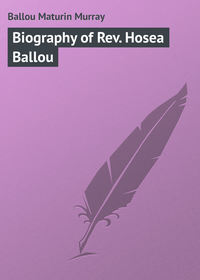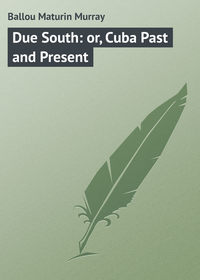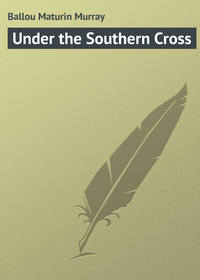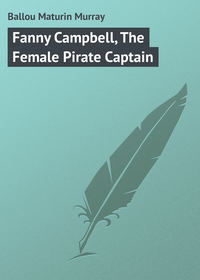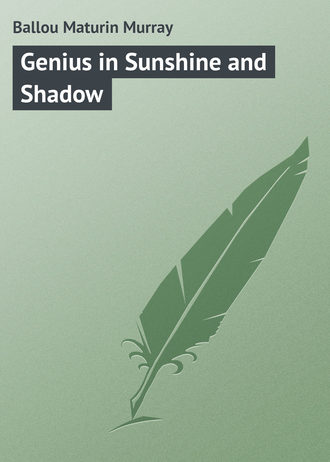 полная версия
полная версияGenius in Sunshine and Shadow
"To write with fury and correct with phlegm."
Dr. Darwin, the ingenious English poet, wrote his works, like some others of whom we have spoken, on scraps of paper with a pencil while travelling. His old-fashioned sulky was so full of books as to give barely room for him to sit and to carry a well-stored hamper of fruits and sweetmeats, of which he was immoderately fond.
Rousseau tells us that he composed in bed at night, or else out of doors while walking, carefully recording his ideas in his brain, arranging and turning them many times until they satisfied him, and then he committed them to paper perfected. He said it was in vain for him to attempt to compose at a table surrounded by books and all the usual accessories of an author. Irving wrote most of the "Stout Gentleman" mounted on a stile at Stratford-on-Avon, while his friend Leslie, the painter, was engaged in taking sketches of the interesting locality. Jane Taylor, the English poetess and prose writer, began to produce creditable work at a very early age, and used at first to compose tales and dramas while whipping a top, committing them to paper at the close of that somewhat trivial exercise. As she grew older she said that she could find mental inspiration only from outdoor exercise.
Petavius, the learned Jesuit, when composing his "Theologica Dogmata" and other works, would leave his table and pen at the end of every other hour to twirl his chair, first with one hand, then with the other, for ten minutes, by way of exercise. Cardinal Richelieu resorted to jumping in his garden, and in bad weather leaped over the chairs and tables indoors, – an exercise which seemed to have a special charm for him. Samuel Clark, the English philosopher and mathematician, adopted Richelieu's plan of exercise when tired of continuous writing. Pope says, with regard to exercise, "I, like a poor squirrel, am continually in motion, indeed, but it is only a cage of three feet: my little excursions are like those of a shopkeeper, who walks every day a mile or two before his own door, but minds his business all the while."
We are told that Douglas Jerrold, when engaged in preparing literary matter, used to walk back and forth before his desk, talking wildly to himself, occasionally stopping to note down his thoughts. Sometimes he would burst forth in boisterous laughter when he hit upon a droll idea. He was always extremely restless, would pass out of the house into the garden and stroll about, carelessly picking leaves from the trees and chewing them; then suddenly hastening back to his desk, he recorded any thoughts or sentences which had formed themselves in his mind. Jerrold wrote so fine a hand, forming his letters so minutely, that his manuscript was hardly legible to those not accustomed to it. He was very fastidious about his writing-desk, permitting nothing upon it except pen, ink, and paper. Like most persons who habitually resort to stimulants, he could not be content with a single glass of spirits or wine, but consumed many, until he was only too often unfitted for mental labor. Jerrold's wit was of a coarser texture than that of Sheridan, but, unlike his, it came with spontaneous force; it was always ready, though it had not the polish which premeditation is able to impart. Oftentimes his wit was severely sarcastic, but as a rule it was only genial and mirth-provoking.
It was asked in Jerrold's club, on a certain occasion, what was the best definition of dogmatism. "There is but one," he instantly replied, – "the maturity of puppyism." A member remarked one day that the business of a mutual acquaintance was going to the devil. "All right," said Jerrold; "then he's sure to get it back again." Another member who was not very popular with the club, hearing a certain melody spoken of, said, "That always carries me away when I hear it." "Cannot some one whistle it?" asked Jerrold. Another member, who was rather given to boasting, said: "Very singular! I dined at the Marchioness of So-and-so's last week, and we actually had no fish." "Easily explained," said Jerrold; "no doubt they had eaten it all upstairs." When Heraud, a somewhat bombastic versifier, asked him if he had read his "Descent into Hell," Jerrold instantly replied, "No; I had rather see it." Being asked what was the idea of Harriet Martineau's rather atheistical book, he answered that it was plain enough, – "There is no God, and Harriet is his Prophet." This is even better than the remark of another wit who, when asked what was the outcome of a meeting before which three of the ablest and most dogmatic Positivists in England made speeches, replied that the result arrived at was this: that there were three persons and no God. Jerrold could not confine himself to any regular system of work, but drove the quill at such times and only to such purpose as his erratic mood indicated, jumping from one subject to another like one crossing a brook upon stepping-stones. This, however, was a habit by no means peculiar to Douglas Jerrold. There are some ludicrous stories told of him; like that of his being pursued by a printer's boy about the town, from house to club, from club to the theatre, and so on, and finally of his being overtaken, getting into a corner and writing an admirable article with pencil and paper on the top of his hat.
Agassiz,79 the great Swiss naturalist, who became an adopted and honored son of this country, was singularly unmethodical in his habits of professional labor. If he was suddenly seized with an interest in some scientific inquiry, he would pursue it at once, putting by all present work, though it might be that he had just got fairly started in another direction. "I always like to take advantage," he would say, "of my productive moods." The rule that we must finish one thing before we begin another, had no force with him. An individual connected with the lyceum of a neighboring city called upon Agassiz to induce him to lecture on a certain occasion, but was courteously informed by the scientist that he could not comply with the request. "It will be a great disappointment to our citizens," suggested the caller. "I am sorry for that," replied Agassiz. "We will cheerfully give you double the usual price," added the agent, "if you will accommodate us." "Ah, my dear sir," replied the scientist, with that earnest but genial expression so natural to his manly features, "I cannot afford to waste time in making money."
A very similar habit of composition or study possessed Goldsmith, Coleridge, Wordsworth, Pope, and some others of the poets, who not infrequently laid by a half-constructed composition for two or three years, then finally took up the neglected theme, finished and published it. This unmethodical style of doing things is but one of the many eccentricities of genius. Scott said he never knew a man of much ability who could be perfectly regular in his habits, while he had known many a blockhead who could. Southey and Coleridge were at complete antipodes in regard to regularity of habits and punctuality: the former did everything by rule, the latter nothing. Charles Lamb said of Coleridge, "He left forty thousand treatises on metaphysics and divinity, not one of them complete." Neither Agassiz, Coleridge, nor any of similar irregularity in work, is to be imitated in those respects. Had it not been for Agassiz's far-seeing and vigorous powers, – in short, for his great genius, he could never have accomplished his remarkable mission. The deduction which we naturally draw is, that method is a good servant but a bad master. If genius were to be trammelled by system and order, it would suffocate. Perhaps Montaigne was nearly right when he thought that individuals ought sometimes to cross the line of fixed rules, in order to awaken their vigor and keep them from growing musty.
Coleridge was much addicted to the habit of marginal writing; which, though sadly wasteful on his own part, was very enriching to those friends who loaned him from their libraries.80 Charles Lamb, who was not inclined to spare book-borrowers as a tribe, had no reflections to cast upon Coleridge for this habit. The depth, weight, and originality of his comments as hastily and carelessly penned on the margins of books were wonderful, and if collected and classified would form several volumes, not only of captivating interest, but of rare critical value, as the few which have been brought together abundantly prove. In one volume which he returned to Lamb is this memorandum: "I shall die soon, my dear Charles Lamb, and then you will not be vexed that I have be-scribbled your book. S. T. C., May 2d, 1811." "Elia" valued these marginal notes beyond price, and said that to lose a volume to Coleridge carried some sense and meaning with it. These critical notes often nearly equalled in quantity of matter the original text. In his article upon the subject, Lamb says, "I counsel thee, shut not thy heart nor thy library against S. T. C." As we have already said, while this erratic expenditure of Coleridge's rare literary taste and judgment enriched others, it in a degree impoverished himself; for had the same time and thought been expended upon consecutive literary work, it would have produced volumes of inestimable value to the world at large, and have proved monumental to their author.
Byron was addicted to marginalizing; and though he could not equal Coleridge in the profundity of his criticisms, or impart such charming interest to them, still he was quite original and often piquant. Burns contented himself with trifling criticisms of approval or disapproval pencilled in the margin of books, especially poetical ones, which were nearly all he was in the habit of reading.
Many famous authors and public men have been extravagantly fond of the rod and line, disciples of that patient and poetical angler, Izaak Walton. George Herbert, the English poet; Henry Wotton, diplomatist and author; Dr. Paley, Archdeacon of Carlisle; John Dryden, poet and dramatist; Sydney Smith, the witty divine; Sir Humphry Davy, the eminent chemist, – all were devoted anglers.81 This brief list might be largely increased. Bulwer-Lytton says: "Though no participator in the joys of more vehement sport, I have a pleasure that I cannot reconcile to my abstract notions of the tenderness due to dumb creatures, in the tranquil cruelty of angling. I can only palliate the wanton destructiveness of my amusement by trying to assure myself that my pleasure does not spring from the success of the treachery I practise towards a poor little fish, but rather from that innocent revelry in the luxuriance of summer life which only anglers enjoy to the utmost." Walton puts himself on record in these words: "We may say of angling, as Dr. Boteler said of strawberries: 'Doubtless God could have made a better berry, but doubtless God never did;' and so, if I might be judge, God never did make a more calm, quiet, innocent recreation than angling." Sydney Smith declared it to be an occupation fit for a bishop, and that it need in no way interfere with sermon-making.
Perhaps the best thing said or done in angling is an unpublished anecdote of the great preacher to the seamen, – the late Father Taylor, of Boston. He was once lured to try his hand at the rod, and soon brought up a very little fish that had been tempted by his bait. He took the small creature carefully from the hook, gazed at it a moment, and then cast it back into the water, with this advice: "My little friend, go and tell your mother that you have seen a ghost!"
Dr. Parr, the profound English scholar, was a most inveterate smoker; so was Charles Lamb,82 who one day said to his doctor, "I have acquired this habit by toiling over it, as some men toil after virtue."
Robert Hall, the popular English divine, was very much addicted to tobacco and other stimulants. A friend who found him in his study blowing forth clouds of smoke from his lips, said, "There you are, at your old idol!" "Yes," replied the divine, "burning it." Napoleon could never abide smoking tobacco; yet observing how much other men seemed to enjoy it, he tried to acquire the habit, but finally gave it up in disgust. He, however, took snuff to excess. Sir Walter Scott was very fond of smoking. Thackeray, like Burns, loved to get away by himself and enjoy the flavor of a rank tobacco-pipe. Carlyle, like Tennyson, did not care for a cigar, but kept a pipe in his mouth most of his waking hours. Bulwer-Lytton was a ceaseless smoker; and there are few if any notable Germans who have not been addicted to the same indulgence. The nicotine produced from tobacco is one of the most deadly of all poisons, as has been proven by some startling experiments in the Paris hospitals.83 Thackeray said there was good eating in Scott's novels. Extending the remark, it might be added that there was good drinking in those of Dickens, and good smoking in those of Thackeray.
Dean Swift relieved his sombre moods by harnessing his servants with cords and driving them, school-boy fashion, up and down the stairs and through the garden of the deanery of St. Patrick's Cathedral, Dublin. Dickens was controlled by a nervous activity which made him crave physical exercise of some sort, and he daily found relief in an eight or ten mile walk. Thackeray once told the author of these pages that he preferred to take his exercise driving upon very easy roads. When Dickens was in this country he was frequently accompanied in his long walks by the late James T. Fields, who was ever ready to sacrifice himself to the pleasure of others. Mr. Fields was not partial to extreme pedestrian exercise, and the author of the "Pickwick Papers" tested his good-nature to the verge of exhaustion in this respect. Dumas, when not otherwise engaged, was accustomed to go down into his kitchen, and, deposing the servants, cook his own dinner; and an excellent cook he must have been, if one half the stories rife about him be true. Besides, did he not write an original cook-book, which still stands for good authority in the cafés of the boulevards?
Dr. Warton, the English critic and author, as represented by contemporary authority, was noted for a love of vulgar society, which he daily sought in low tap-rooms and gin-shops, where he joked away the evening hours. Turner the painter had similar tastes and habits, though he was of a reserved and unsociable character, and noted for his parsimony. Shelley, Goldsmith, and Macaulay delighted in the company of young children. "They are so near to God," said Shelley. "Intercourse with them freshens and rejuvenates one's soul," wrote Macaulay. "I love these little people; and it is not a small thing when they, who are so fresh from God, love us," said Dickens. Children always had a most tender and humanizing effect upon Douglas Jerrold, no matter what was his mood. He writes: "A creature undefiled by the taint of the world, unvexed by its injustice, unwearied by its hollow pleasures; a being fresh from the source of light, with something of its universal lustre in it. If childhood be this, how holy the duty to see that in its onward growth it shall be no other!"
History tells us that Henry of Navarre, who was every inch a king, was often seen upon his palace floor with two of his children upon his back, playing elephant and rider. What a peep into the king's heart we get by this little picture of his domestic life! Where was all the monarch's pride of State, his kingly dignity? "How hard it is to hide the sparks of nature!" It is related of Epictetus that he would steal away from his philosophical associates to pass an hour romping with a group of children, – "to prattle, to creep, and to play with them." Charles Robert Maturin, the poet, author of the tragedy of "Bertram," and other successful dramas, could not endure to have children near him during his hours of literary composition. At such times he was particularly sensitive, and pasted a wafer on his forehead as a token to the members of his family that he was not to be interrupted. He said if he lost the thread of his ideas even for a moment, they were gone from him altogether. Sir Walter Scott, on the contrary, was ever ready to lay down his pen at any moment, to exchange pleasant words with child or adult, friend or stranger; and it was notorious that children could always interrupt him with impunity. He declared that their childish accents made his heart dance with glee. He could not check their confidence and simplicity, though pressed upon him when his thoughts were soaring in poetic flights or describing vivid scenes of warfare and carnage. Scott preserved considerable system, nevertheless, in his composition and labor. He lay awake, he tells us, for a brief period in the quiet of the early morning, and arranged carefully in his mind the work of the coming day. He laid out systematically the subject upon which he was writing, and resolved in what manner he would treat it. Thus it was that he could lay down his pen at any moment without deranging the purpose of the work. He had one axiom to which he tenaciously adhered, and was often heard to repeat it to his dependants and friends: "Do whatever is to be done, at once; take the hours of reflection or recreation after business, and never before it."
Schiller said that children made him half glad and half sorry, – always inclined to moralize. "Happy child," he exclaims, "the cradle is still to thee a vast space: become a man, and the boundless world will be too small for thee." Goethe was ever watchful, loving, and tender with the young. "Children," he says, "like dogs, have so sharp and fine a scent, that they detect and hunt out everything." He thought their innocent delusions should be held sacred. Elihu Burritt, the "Learned Blacksmith," says that he once congratulated an humble farmer upon having a fine group of sons. "Yes, they are good boys," was the father's answer. "I talk to them often, but I do not beat my children, – the world will beat them by and by, if they live." A fine thought, rudely expressed.
Shelley's interest in children was connected with his half belief in the Platonic doctrine of pre-existence. As he was passing over one of the great London bridges, meditating on the mystery, he saw a poor working-woman with a child a few months old in her arms. Here was an opportunity to bring the theory to a decisive test: and in his impulsive way he took the infant from its astonished mother, and in his shrill voice began to ask it questions as to the world from which it had so recently come. The child screamed, the indignant parent called for the police to rescue her baby from the philosophical kidnapper; and as Shelley reluctantly delivered the infant to its mother's arms, he muttered, as he passed on, "How strange it is that these little creatures should be so provokingly reticent!" Shelley was a child himself in many respects; in illustration of which the reader has only to recall the poet's singular amusement of sailing paper boats whenever he found himself conveniently near a pond. So long as the paper which he chanced to have about him lasted, he remained riveted to the spot. First he would use the cover of letters, next letters of little value; but he could not resist the temptation, finally, of employing for the purpose the letters of his most valued correspondents. He always carried a book in his pocket, but the fly-leaves were all consumed in forming these paper boats and setting them adrift to constitute a miniature fleet. Once he found himself on the banks of the Serpentine River without paper of any sort except a ten-pound note. He refrained for a while; but presently it was rapidly twisted into a boat by his skilful fingers, and devoted to his boat-sailing purpose without further delay. Its progress being watched, it was finally picked up on the opposite shore of the river and returned to the owner for more legitimate use.
Charles Lamb in his quaint way says: "I know that sweet children are the sweetest things in nature, not even excepting the delicate creatures which bear them; but the prettier the kind of a thing is, the more desirable it is that it should be pretty of its kind. One daisy differs not much from another in glory; but a violet should look and smell the daintiest."84
Good and substantial food is quite as necessary to authors and public men, as to those who gain their livelihood by laborious physical employment. Authors are, however, as a rule, rather inclined to free indulgence at table. There is as much intemperance in eating as in drinking. Tom Moore, who was the best diner-out of his day, said, by way of excusing this habit, "In grief, I have always found eating a wonderful relief." N. P. Willis was quite a gourmand. "There are," he once wrote, "so few invalids untemptable by those deadly domestic enemies, sweetmeats, pastry, and gravies, that the usual civilities at a meal are very like being politely assisted to the grave." It is certainly better to punish our appetites than to be punished by them. Dickens and Thackeray were both inclined to free indulgence at the table, the former being struck with death at a public banquet. Dean Swift often gave better advice than he was himself inclined to follow. He says: "Temperance," meaning both in eating and drinking, "is a necessary virtue to great men, since it is the parent of the mind, which philosophy allows to be one of the greatest felicities in life." Macready, the famous English tragedian, would not touch food of any kind for some hours before making one of his grand dramatic efforts, but drank freely of strong tea before appearing in public, – a subtle stimulant in which the late Rufus Choate freely indulged, particularly before addressing a jury.
Abstinence in diet was a special virtue with Milton. Shelley utterly despised the pleasures of the table. Walter Scott was an abstemious eater. Pope was a great epicure, and so was the poet Gay. Speaking of appetite, Coleridge tells us of a man he once saw at a dinner-table, who struck him as remarkable for his dignity and wise face. The awful charm of his manner was not broken until the muffins appeared, and then the wise one exclaimed, "Them's the jockeys for me!" Dignity is sometimes very rudely unmasked, and an imposing air is nearly always the cloak of a fool. Newton lived on the simplest food. "If Aristotle could diet on acorns," he said, "so can I;" and before sitting down to study he exercised freely and abstained from food. Dr. George Fordyce, the eminent Scotch physician, ate but one meal a day, saying that if one meal in twenty-four hours was enough for a lion, it was sufficient for a man; but in order not to be like the lion, he drank a bottle of port, half a pint of brandy, and a pitcher of ale with his one meal. Lamartine used to pass one day in ten fasting, as he said, to clear both stomach and brain. Aristo, the stoic philosopher, used to fast for days on acorns. Thomas Byron, a well-known author, never ate flesh of any sort. Dryden's favorite dish was a chine of bacon. Charles Lamb was enamoured of roast pig. He said, "You can no more improve sucking pig than you can refine a violet!" Keats was a very fastidious eater, but was fond of the table, especially where there was good wine,85 and yet he was not addicted to its intemperate use. Dr. Johnson was greedy over boiled mutton; and Dr. Rhondelet, the famous writer on fishes, was so fond of figs that he died from having at one time eaten immoderately of them. Barrow, one of the greatest of English theologians and mathematicians, is said to have died of a surfeit of pears, – a fruit of which he was extravagantly fond.
Gastronomic appetite and reason have been compared to two buckets in a well; when one is at the top the other is at the bottom. Byron nearly starved himself to prevent growing gross and uninteresting in physical aspect. Addison was addicted to port and claret, and was accustomed, as already spoken of, while meditating a moral or political essay, to pace up and down the long gallery of Holland House.86 When a humorous suggestion occurred to his fertile fancy, he solaced himself with claret; or fortified himself with a glass of port when a moral sentiment required to be enforced by an impressive close to a beautifully constructed sentence.87 This was after his frigid marriage to the Dowager Countess of Warwick. On his death-bed he is reported to have said to her graceless son, "See how a Christian can die!" Probably the profligate youth, spying his father-in-law as he walked in the gallery, might have irreverently remarked: "See how a Christian can drink!" But the truth is that Addison, judged by the habits of his time, should be considered a moderate drinker. Poe's nerves were so shattered that a slight amount of wine would intoxicate him into a frenzy of dissipation; the same amount swallowed by a regular toper would hardly disturb his brain at all. While Pitt was quite a young man, he was so weakly that his physician ordered him to drink freely of port wine, and he thus contracted the habit of depending upon stimulants, and could not do without them. Lord Greville tells us he has seen him swallow a bottle of port wine by tumblerfuls before going to the House. This, together with the habit of late suppers, helped materially to shorten his life.88





